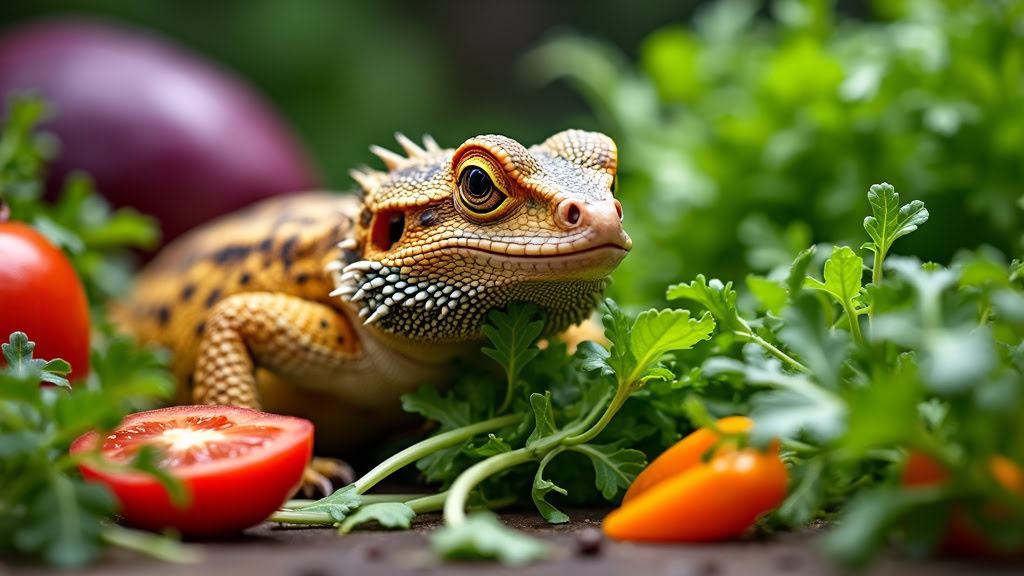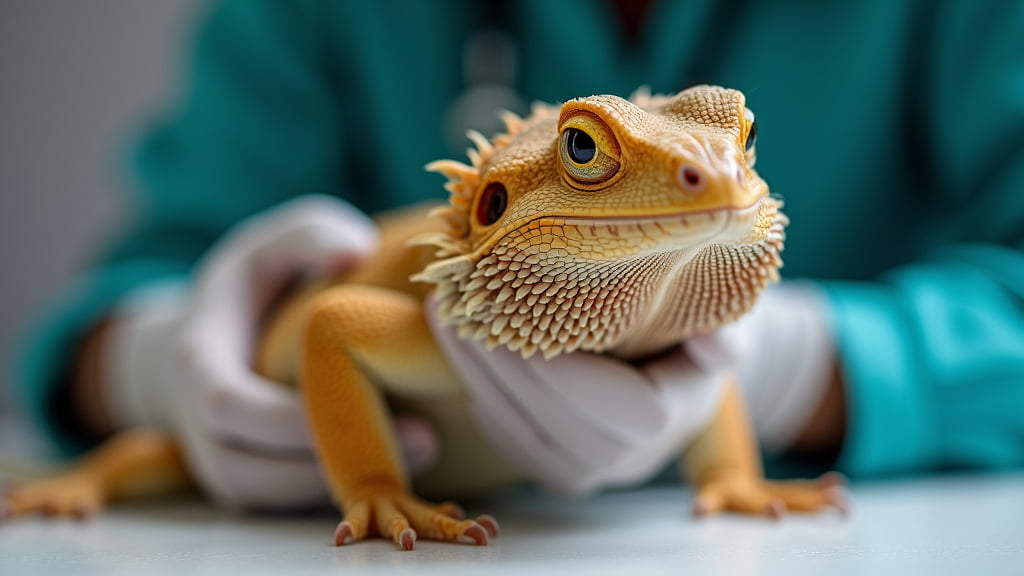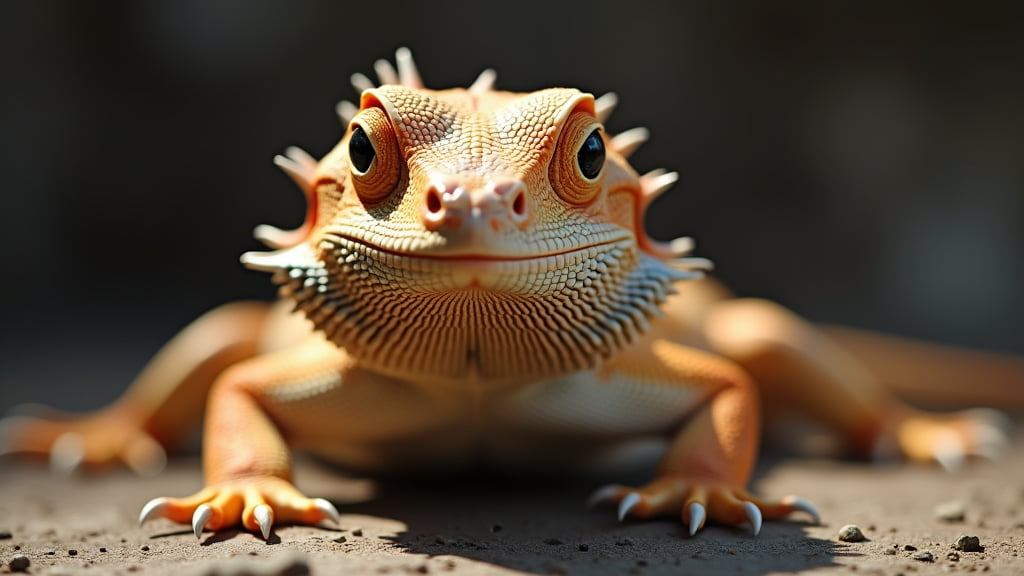Bearded dragons, like all animals, can experience stress. Recognizing signs of stress in these reptiles is crucial for owners to take appropriate action. Common indicators include behavioral changes such as increased aggression, lethargy, loss of appetite, pacing, or restlessness.
Changes in coloration may also occur. Physical symptoms can manifest as rapid breathing, gaping, or beard puffing. Hiding behavior is another potential sign of stress in bearded dragons.
A typically sociable and active dragon that suddenly spends excessive time hiding may be experiencing stress. Excessive shedding and skin darkening can also indicate stress in these reptiles. To effectively identify stress in bearded dragons, owners should be familiar with their pet’s normal behavior and remain observant of any deviations.
By recognizing these signs, owners can address underlying causes and create a more comfortable environment for their pets.
Key Takeaways
- Signs of stress in Bearded Dragons include glass surfing, loss of appetite, and aggressive behavior
- Create a stress-free environment for Bearded Dragons by providing proper temperature, lighting, and hiding spots
- Proper nutrition for Bearded Dragons includes a diet of live insects, leafy greens, and occasional fruits
- Handle and socialize with Bearded Dragons regularly to help alleviate stress and build trust
- Common stress triggers for Bearded Dragons include improper handling, loud noises, and overcrowded enclosures
- Seek professional help from a reptile veterinarian if you notice prolonged signs of stress in your Bearded Dragon
- Implement stress-relief techniques such as providing enrichment activities and regular exercise for your Bearded Dragon
Creating a stress-free environment for Bearded Dragons
Providing an Ideal Enclosure
The enclosure should be large enough to allow for adequate movement, with proper heating and lighting, and offer hiding spots and climbing structures. This will help create a comfortable and stimulating environment for the bearded dragon.
Maintaining a Clean and Hygienic Environment
A clean and hygienic environment is vital in reducing stress in bearded dragons. Dirty enclosures can contribute to stress, so regular cleaning and maintenance are necessary to keep the environment clean and healthy.
Minimizing Disturbances and Providing a Sense of Security
To minimize disturbances and provide a sense of security, place the enclosure in a quiet area of the home, away from high-traffic areas and loud noises. Using opaque barriers around the enclosure can also help reduce stress by providing the animal with a sense of privacy. Establishing a consistent day-night cycle by providing a regular light and dark schedule is also essential in reducing stress in bearded dragons.
Providing proper nutrition to reduce stress in Bearded Dragons

Proper nutrition is essential for reducing stress in bearded dragons. A well-balanced diet that meets the nutritional needs of the animal is crucial for maintaining its overall health and well-being. Bearded dragons are omnivorous reptiles that require a diet consisting of both insects and plant matter.
It’s important for owners to provide a variety of insects such as crickets, mealworms, and roaches, as well as a selection of leafy greens and vegetables. In addition to offering a diverse diet, it’s important to ensure that the food provided is fresh and of high quality. Insects should be gut-loaded with nutritious foods before being fed to the bearded dragon, and any uneaten insects should be removed from the enclosure to prevent stress.
It’s also important to provide appropriate supplementation, such as calcium and vitamin D3, to prevent nutritional deficiencies that can contribute to stress in bearded dragons.
Handling and socializing with Bearded Dragons to alleviate stress
Handling and socializing with bearded dragons can help alleviate stress and promote a sense of security and trust between the animal and its owner. However, it’s important for owners to approach handling with caution and respect for the animal’s boundaries. Bearded dragons are generally docile creatures, but they may become stressed if they are handled too frequently or too roughly.
It’s important to allow the animal to initiate contact and to handle it gently and confidently. Socializing with bearded dragons can also help reduce stress by providing mental stimulation and enrichment. This can be achieved through activities such as supervised exploration outside of the enclosure, interaction with safe toys and objects, and exposure to new sights and sounds.
Additionally, providing opportunities for basking in natural sunlight or UVB lighting can help reduce stress by promoting natural behaviors and providing essential UVB radiation.
Recognizing and addressing common stress triggers in Bearded Dragons
There are several common stress triggers that can affect bearded dragons, and it’s important for owners to recognize and address these triggers in order to promote the well-being of their pets. One common stress trigger for bearded dragons is improper handling or interaction with other pets or humans. Rough handling or exposure to aggressive animals can cause significant stress in bearded dragons, so it’s important for owners to supervise interactions and provide a safe and secure environment.
Another common stress trigger for bearded dragons is changes in their environment or routine. This can include moving to a new location, changes in temperature or lighting, or disruptions to their feeding schedule. By being aware of these potential triggers, owners can take steps to minimize their impact on the animal and help reduce stress.
Additionally, it’s important to be mindful of environmental factors such as excessive noise, vibrations, or visual disturbances that can contribute to stress in bearded dragons.
Seeking professional help for stressed Bearded Dragons

Identifying Underlying Health Issues
If a bearded dragon is exhibiting signs of stress that cannot be alleviated through environmental adjustments or changes in handling, it may be necessary to seek professional help from a veterinarian or reptile specialist. These professionals can conduct a thorough examination of the animal to identify any underlying health issues that may be contributing to its stress.
Guidance on Proper Care and Handling
Additionally, they can provide guidance on proper husbandry practices, nutrition, and handling techniques that can help reduce stress in bearded dragons.
Additional Support and Treatment Options
In some cases, stressed bearded dragons may benefit from additional support such as behavioral modification techniques or medication. A veterinarian with experience in reptile care can provide tailored recommendations based on the individual needs of the animal.
The Importance of Seeking Professional Help
It’s important for owners to seek professional help if they are concerned about the well-being of their pet, as prolonged stress can have serious consequences for the health and longevity of bearded dragons.
Implementing stress-relief techniques for Bearded Dragons
In addition to seeking professional help, there are several stress-relief techniques that owners can implement to help alleviate stress in their bearded dragons. One effective technique is providing environmental enrichment through the use of safe toys, climbing structures, and naturalistic elements such as rocks and branches. This can help stimulate natural behaviors and provide mental stimulation for the animal.
Another stress-relief technique for bearded dragons is establishing a consistent routine and environment. By maintaining a regular feeding schedule, light cycle, and temperature gradient within the enclosure, owners can help reduce stress by providing predictability and stability for their pets. Additionally, creating a secure and comfortable hiding spot within the enclosure can provide a sense of security for the animal during times of stress.
In conclusion, understanding the signs of stress in bearded dragons and taking proactive steps to create a stress-free environment, provide proper nutrition, handle and socialize with the animals appropriately, recognize and address common stress triggers, seek professional help when necessary, and implement stress-relief techniques are all essential components of responsible reptile ownership. By prioritizing the well-being of their pets and taking steps to reduce stress, owners can help ensure that their bearded dragons live happy, healthy lives.
If you are interested in learning more about the care and well-being of reptiles, you may want to check out this article on why leopard geckos stop eating. Just like bearded dragons, leopard geckos can also experience stress and health issues in captivity, so it’s important to be aware of the signs and how to address them. Understanding the needs of different reptile species can help ensure that they live happy and healthy lives in our care.
FAQs
What are the common signs of stress in bearded dragons?
Some common signs of stress in bearded dragons include loss of appetite, changes in behavior (such as aggression or lethargy), hiding, pacing, and changes in coloration.
What are the potential causes of stress in bearded dragons?
Potential causes of stress in bearded dragons include improper temperature and humidity levels in their enclosure, inadequate lighting, overcrowding, handling or interaction that is too frequent or rough, and changes in their environment.
How can I alleviate stress in my bearded dragon?
To alleviate stress in your bearded dragon, ensure that their enclosure provides the appropriate temperature, humidity, and lighting. Provide hiding spots and a comfortable environment. Limit handling to reduce stress and ensure a proper diet and clean water are provided.
When should I seek veterinary care for my stressed bearded dragon?
If you have made adjustments to your bearded dragon’s environment and diet and they are still showing signs of stress, it is important to seek veterinary care. Additionally, if your bearded dragon is showing severe or prolonged signs of stress, such as refusing to eat or drink, it is important to seek veterinary care.




